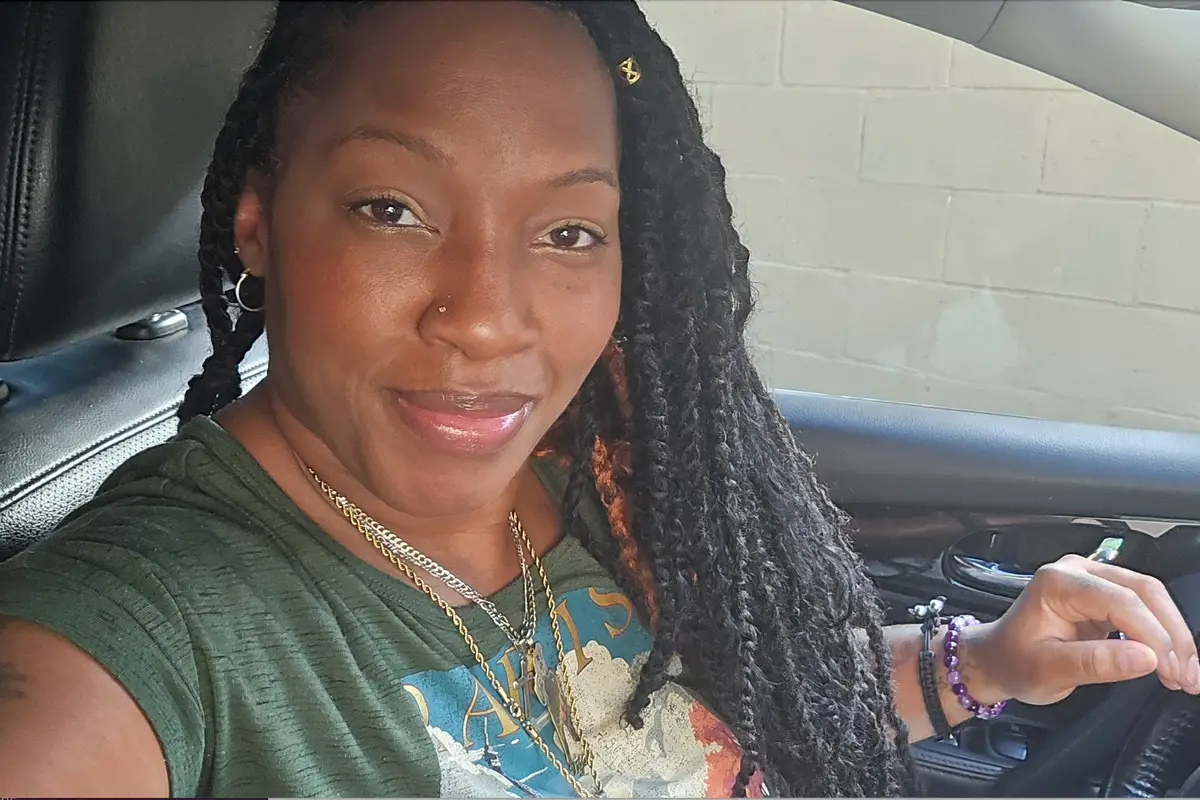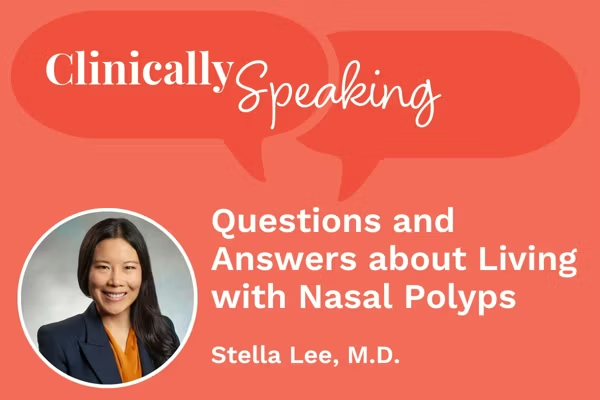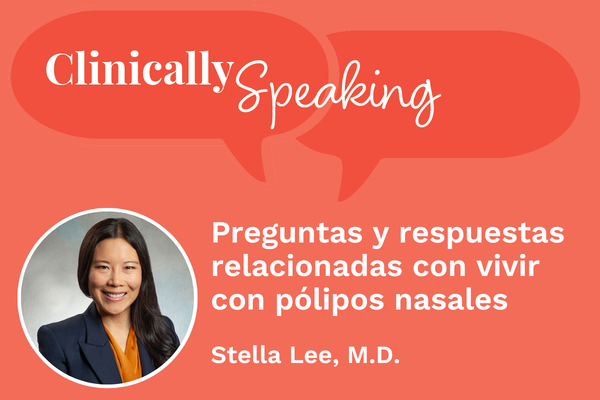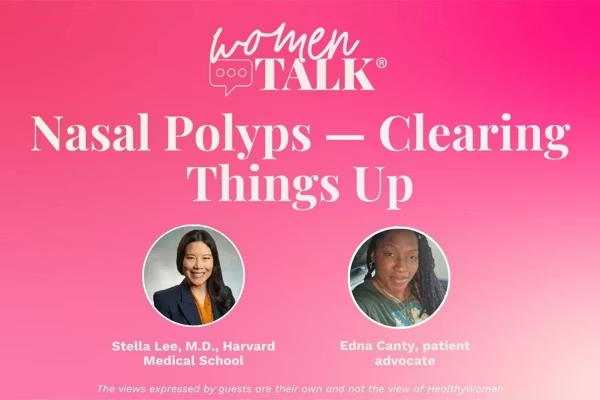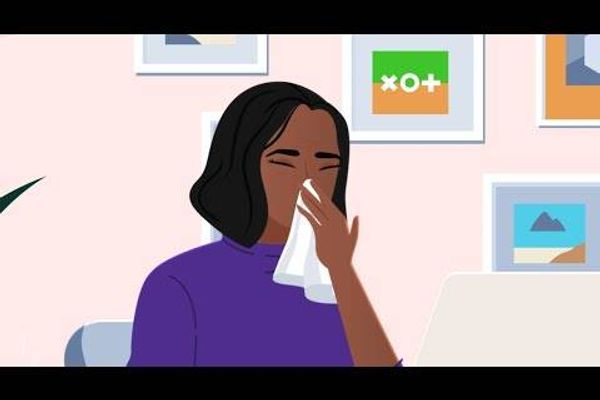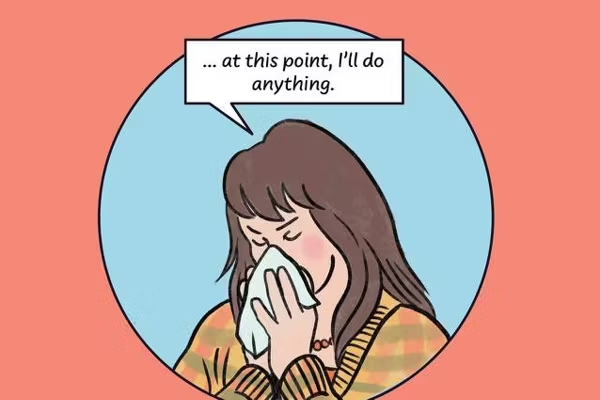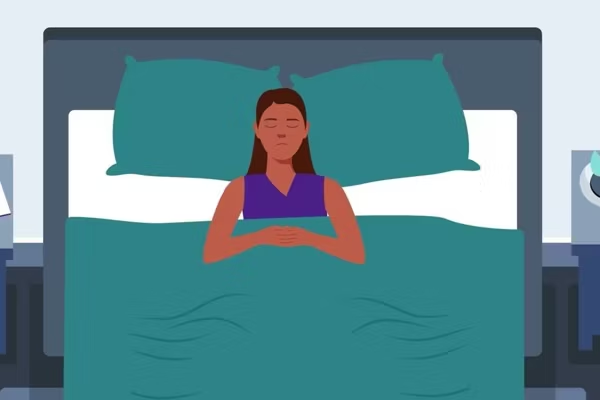September is World Sinus Health Awareness Month.
As told to Erica Rimlinger
Twelve years ago, the nasal congestion began. There were several possible causes I could think of: I might have had a mild cold or seasonal allergies. The flooding that swept into our hometown from the hurricane that year may have triggered my asthma and sinus congestion. Although the FEMA adjusters claimed the flood damage wasn’t bad, I assumed my symptoms were due to mold. I cleaned my home with bleach and, when that didn’t help, had the walls gutted and replaced.
My sinus symptoms were getting worse. One day I looked in the mirror and saw I had a growth in my nose. I blew my nose often, hoping the growth would come out, and all the blowing caused my nose to bleed. But it didn’t come out. I went to my doctor, who prescribed a steroid medication without giving me a diagnosis or explanation of how, or if, the medication would help. Unconvinced, I didn’t take it.
Fatigue, headaches and a new habit of snoring joined congestion as my new normal. I lost my sense of smell. I couldn’t taste anything. I only ate when I was hungry, and I was rarely hungry. My daughter had to alert me when the baby’s diaper had to be changed: I couldn’t smell it.
The lymph nodes in my neck swelled, and my doctor was again stumped. He sent me to “a specialist,” who turned out to be a heart surgeon. The surgeon said nothing useful to help solve the mystery. I realized it was time to start doing my own research into my health condition.
I found there were specialists for sinus issues: otolaryngologists, also known as ear, nose and throat (ENT) doctors. My insurance didn’t require a referral to this specialist, so I found a provider.
The ENT scoped my nasal cavities, and after diagnosing me with a very bad sinus infection, he said I had nasal polyps. “What is that?” I asked. He showed me a picture of a man with a growth on his forehead. “If you don’t have surgery,” he said, “the polyps will grow and grow.”
The surgery he pushed was not a minor surgery. It would take at least three hours or more, and recovery would take longer than a month. I wouldn’t be able to carry my baby for up to six weeks. I left the office with antibiotics for my sinus infection, a date for the surgery and a lot of unanswered, nagging questions. I wanted to hear other options for treatment, but the only option he provided was surgery. He wouldn’t, or couldn’t, tell me if surgery was a permanent solution or a temporary one.
The day of my surgery, I didn’t show up.
The doctor called me and asked why. I told him I was scared. I didn’t want surgery and felt railroaded into it. He told me he was releasing me from his practice.
But I had been doing more research. I found another ENT, who told me steroids and other medications generally used to treat asthma can also shrink polyps. Steroids were a wonder drug for me. I could finally breathe and smell again, and it was such a relief. The doctor warned that, over time, they might lose their effectiveness. These medications were treatments, not cures.
Sure enough, my symptoms crept back after four or five months. This time, I was more open to considering surgery. This new doctor explained the procedure, laid out its advantages and limitations, and gave me the choice. I said yes and scheduled it around Christmas time.
I returned home after surgery overwhelmed, with my nose bleeding. It seemed to bleed for weeks. I dutifully rinsed my sinuses with a medicated sinus rinse for a month. The surgery recovery was intense, but I could smell. I could taste food. I could breathe.
But it didn’t last. Nine months later, I was back at the ENT with all my symptoms back. It turned out surgery, like the medication, was a treatment — not a cure — for some people. I started taking steroids again.
I now had polyps in all my sinus cavities. I hadn’t returned to the ENT that had performed the surgery due to Covid-19 restrictions. A new ENT I found in my county suggested I take steroids again, then have another surgery. I told him I wasn’t going to have surgery again because the recovery was too long and involved. The doctor said he’d cut out cartilage in the sinus cavities to make more space. This didn’t make sense to me. More space meant more room for polyps to grow.
As I gained weight on another round of steroids, I returned to visit the ENT who performed my surgery. He gave me some good news: There was a new treatment available for people who, like me, had undergone several rounds of treatment for recurring polyps. “You are the perfect candidate,” he said. He was able to get my insurance to approve the medication due to my history of recurrent polyps after surgery.
The new medication required an injection, at home or at my general practitioner’s office. After I started the medication, I got my sense of smell, my sleep and my life back.
Researching on reputable websites, I learned recurring polyps can be caused by a chronic immune response called type 2 inflammation. This inflammatory response has no cure and affects multiple systems in the body. My polyps, asthma, allergies and even my eczema are symptoms of this condition.
I learned through this experience the importance of doing your own research and advocating for yourself. My doctors and even my family didn’t realize how much I was suffering. It was never just a cold, just allergies or just a stuffed-up nose. It was my immune system attacking my body on multiple fronts for over a decade and even robbing me of one of my five senses.
I’m still on the injection medication to control my polyps, and medication to treat my other symptoms, and they’re working well. I can smell and breathe normally. I feel healthy and hopeful today that scientific research is going to find not just a treatment but a cure for nasal polyps and the type 2 inflammation that can cause them.
But until that day comes, I know that doing my own research and listening to my own body are key to my treatment and recovery. Even the healthcare providers (HCPs) I trust the most only see me during short, 15- to 30-minute appointments. I keep myself educated on my condition and write out my questions before I go to any HCPs to make sure they get answered to my satisfaction.
Nobody is going to care about my health more than I will, and nobody else is going to live with the consequences of my healthcare. My experience with polyps hasn’t led me to a cure, but it has led to successful treatment and the ability, strength and independence to advocate for myself in all medical matters.
Resources
Asthma and Allergy Foundation — Nasal Polyps
This educational resource was created with support from GlaxoSmithKline, Sanofi and Regeneron.
Have your own Real Women, Real Stories you want to share? Let us know.
Our Real Women, Real Stories are the authentic experiences of real-life women. The views, opinions and experiences shared in these stories are not endorsed by HealthyWomen and do not necessarily reflect the official policy or position of HealthyWomen.
- Clinically Speaking: Questions and Answers About Nasal Polyps ›
- Nasal Polyps 101 ›
- Nasal Polyps and Type 2 Inflammation - HealthyWomen ›
- Los pólipos nasales y la inflamación tipo 2 - HealthyWomen ›
- Living With Nasal Polyps - HealthyWomen ›
- Rita Has Recurring Nasal Polyps - HealthyWomen ›
- WomenTalk: Nasal Polyps - HealthyWomen ›
- Questions and Answers about Living with Nasal Polyps - HealthyWomen ›

